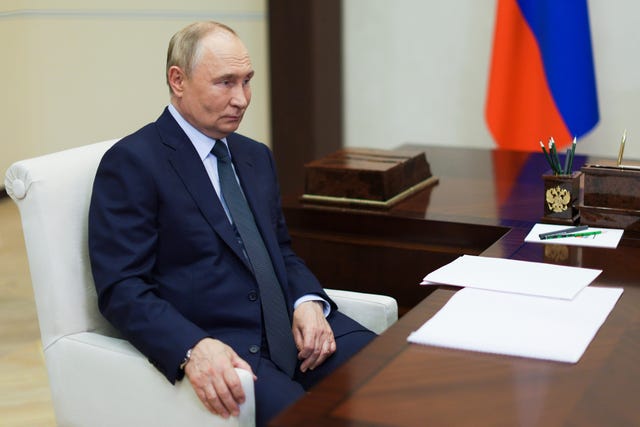Scholz discusses Ukraine with Putin in first such call in two years
Government spokesman Steffen Hebestreit said German Chancellor Olaf Scholz condemned ‘Russia’s war of aggression’ against Ukraine during the call.

German Chancellor Olaf Scholz has spoken to Russian President Vladimir Putin, in what was the Kremlin leader’s first publicly announced conversation with the sitting head of a major Western power in nearly two years.
Mr Scholz urged Mr Putin to be open to negotiations with Ukraine, his office said.
The Kremlin leader responded that any peace deal should acknowledge Russia’s territorial gains and security demands, including that Kyiv renounce joining Nato.

The conflict will reach its 1,000th day on Tuesday, and exiled Russian opposition leaders, including Alexei Navalny’s widow Yulia, have set an anti-war rally for Sunday in Berlin.
“The chancellor urged Russia to be willing to negotiate with Ukraine with the aim of achieving a just and lasting peace and stressed Germany’s unwavering determination to support Ukraine in its fight against Russian aggression for as long as necessary,” Mr Hebestreit said in a statement.
The new communication between Mr Scholz and Mr Putin – their first since December 2022 – comes at a time of widespread speculation about what the new administration of US President-elect Donald Trump will mean for Ukraine.
Mr Scholz faces a political crisis at home and has called for a vote of confidence next month, with an early election in February.
Washington has been Ukraine’s biggest military backer, but Mr Trump has repeatedly questioned the amount of aid being given to Ukraine.
While Mr Trump has suggested he could settle the war quickly, Ukraine has ruled out giving up any territory to Moscow in return for peace.
Ukrainian President Volodymyr Zelensky criticised Mr Scholz’s call to Mr Putin, calling it “a Pandora’s box” that would only serve to make Russia less isolated.
“Now there may be other conversations, other calls. Just a lot of words. And this is exactly what Putin has wanted for a long time,” Mr Zelensky said in his nightly address.
“It is crucial for him to weaken his isolation. … And to engage in negotiations, ordinary negotiations, that will lead to nothing.”
Mr Scholz condemned Russian air raids on Ukrainian civilian infrastructure and warned that the deployment of North Korean troops to Russia to fight in the war would mark a serious escalation.
The US, South Korea and Ukraine say North Korea has sent thousands of troops to Russia to support its war against Ukraine.
The Kremlin said Germany initiated the call, during which the leaders had a “detailed and frank exchange of opinions on the situation in Ukraine”.
Mr Putin blamed “the current crisis” on what he called Nato’s “long-standing aggressive policy aimed at creating an anti-Russian stronghold on Ukrainian territory while ignoring our country’s security interests and trampling on the rights of Russian-speaking residents”, a Kremlin readout said.
“Possible agreements should take into account the interests of the Russian Federation in the security sphere, proceed from new territorial realities, and most importantly, eliminate the root causes of the conflict,” the readout said.
Mr Putin, who earlier this month said it is up to Western leaders to resume contact with Russia if they want, also noted the “unprecedented degradation” in bilateral relations between Germany and Russia, the Kremlin statement said, while noting that the leaders also discussed the situation in the Middle East.
Kremlin spokesman Dmitry Peskov said the leaders had a “detailed” and “frank” exchange of opinions but added that “there is no talk about convergence of opinions”.
The two sides agreed to remain in contact after the call.





